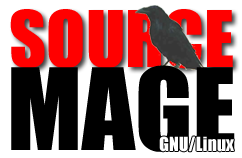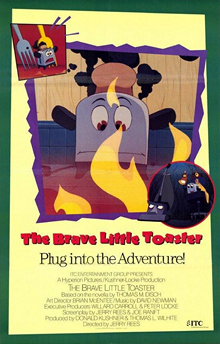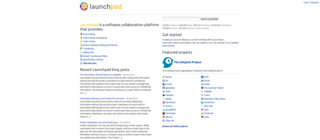
GNU is an extensive collection of free software, which can be used as an operating system or can be used in parts with other operating systems. The use of the completed GNU tools led to the family of operating systems popularly known as Linux. Most of GNU is licensed under the GNU Project's own General Public License (GPL).
A turnkey, a turnkey project, or a turnkey operation is a type of project that is constructed so that it can be sold to any buyer as a completed product. This is contrasted with build to order, where the constructor builds an item to the buyer's exact specifications, or when an incomplete product is sold with the assumption that the buyer would complete it.

Source Mage is a source-based Linux distribution descended from Sorcerer. Components of this operating system are downloaded as source code and compiled locally on the user's computer.
The NewTek Video Toaster is a combination of hardware and software for the editing and production of NTSC standard-definition video. The plug-in expansion card initially worked with the Amiga 2000 computer and provides a number of BNC connectors on the exposed rear edge that provide connectivity to common analog video sources like VHS VCRs. The related software tools support video switching, luma keying, character generation, animation, and image manipulation.

A home appliance, also referred to as a domestic appliance, an electric appliance or a household appliance, is a machine which assists in household functions such as cooking, cleaning and food preservation.

Within the free software and the open-source software communities there is controversy over whether to refer to computer operating systems that use a combination of GNU software and the Linux kernel as "GNU/Linux" or "Linux" systems.
Dependency hell is a colloquial term for the frustration of some software users who have installed software packages which have dependencies on specific versions of other software packages.

Windows Installer is a software component and application programming interface (API) of Microsoft Windows used for the installation, maintenance, and removal of software. The installation information, and optionally the files themselves, are packaged in installation packages, loosely relational databases structured as COM Structured Storages and commonly known as "MSI files", from their default filename extensions. The packages with the file extensions mst contain Windows Installer "Transformation Scripts", those with the msm extensions contain "Merge Modules" and the file extension pcp is used for "Patch Creation Properties". Windows Installer contains significant changes from its predecessor, Setup API. New features include a GUI framework and automatic generation of the uninstallation sequence. Windows Installer is positioned as an alternative to stand-alone executable installer frameworks such as older versions of InstallShield and NSIS.

The Brave Little Toaster is a 1987 American independent animated musical adventure drama film directed by Jerry Rees. It is based on the 1980 novella of the same name by Thomas M. Disch. The film stars Deanna Oliver, Timothy E. Day, Jon Lovitz, Tim Stack, and Thurl Ravenscroft, with Wayne Kaatz, Colette Savage, Phil Hartman, Joe Ranft, and Jim Jackman in supporting roles. It is set in a world where domestic appliances and other consumer electronics come to life, pretending to be lifeless in the presence of humans. The story focuses on five anthropomorphic household appliances, which include a toaster, a lamp stand, a blanket, a radio and a vacuum cleaner, who go on a quest to search for their owner.

Launchpad is a web application and website that allows users to develop and maintain software, particularly open-source software. It is developed and maintained by Canonical Ltd.
A Freedom Toaster is a public kiosk that will burn copies of free software onto user-provided CDs and DVDs.
A toaster is a device to cook bread.
A software appliance is a software application combined with just enough operating system (JeOS) to run optimally on industry-standard hardware or in a virtual machine. It is a software distribution or firmware that implements a computer appliance.
The term Open Archival Information System refers to the ISO OAIS Reference Model for an OAIS. This reference model is defined by recommendation CCSDS 650.0-B-2 of the Consultative Committee for Space Data Systems; this text is identical to = 57284 ISO 14721:2012. The CCSDS's purview is space agencies, but the OAIS model it developed has proved useful to other organizations and institutions with digital archiving needs. OAIS, known as ISO 14721:2003, is widely accepted and utilized by various organizations and disciplines, both national and international, and was designed to ensure preservation. The OAIS standard, published in 2005, is considered the optimum standard to create and maintain a digital repository over a long period of time.
In computing, the term data warehouse appliance (DWA) was coined by Foster Hinshaw for a computer architecture for data warehouses (DW) specifically marketed for big data analysis and discovery that is simple to use and has a high performance for the workload. A DWA includes an integrated set of servers, storage, operating systems, and databases.
Just enough operating system is a paradigm for customizing operating systems to fit the needs of a particular application such as for a software appliance. The platform only includes the operating system components required to support a particular application and any other third-party components contained in the appliance. This makes the appliance smaller, faster and potentially more secure than an application running under a full general-purpose OS.

VMware ThinApp is an application virtualization and portable application creator suite by VMware that can package conventional Windows applications so that they become portable applications by running on another operating system. According to VMware, the product has a success rate of about 90–95% in packaging applications.

The TurnKey Linux Virtual Appliance Library is a free open-source software project which develops a range of Debian-based pre-packaged server software appliances. Turnkey appliances can be deployed as a virtual machine, in cloud computing services such as Amazon Web Services or installed in physical computers.

Hyperbola GNU/Linux-libre is a Linux distribution for the i686 and x86-64 architectures. It is based on Arch Linux snapshots and Debian development. It includes the GNU operating system components and the Linux-libre kernel instead of the generic Linux kernel. Hyperbola GNU/Linux-libre is listed by the Free Software Foundation as a completely free operating system, true to their Free System Distribution Guidelines.

Toasternets were an early-1990s instantiation of the decentralized Internet, featuring open-standards-based federated services, radical decentralization, ad-hoc routing and consisting of many small individual and collective networks rather than a cartel of large commercial Internet Service Provider networks. Today's "community networks" and decentralized social networks are the closest modern inheritors of the ethos of the 1991-1994 era Toasternets.









